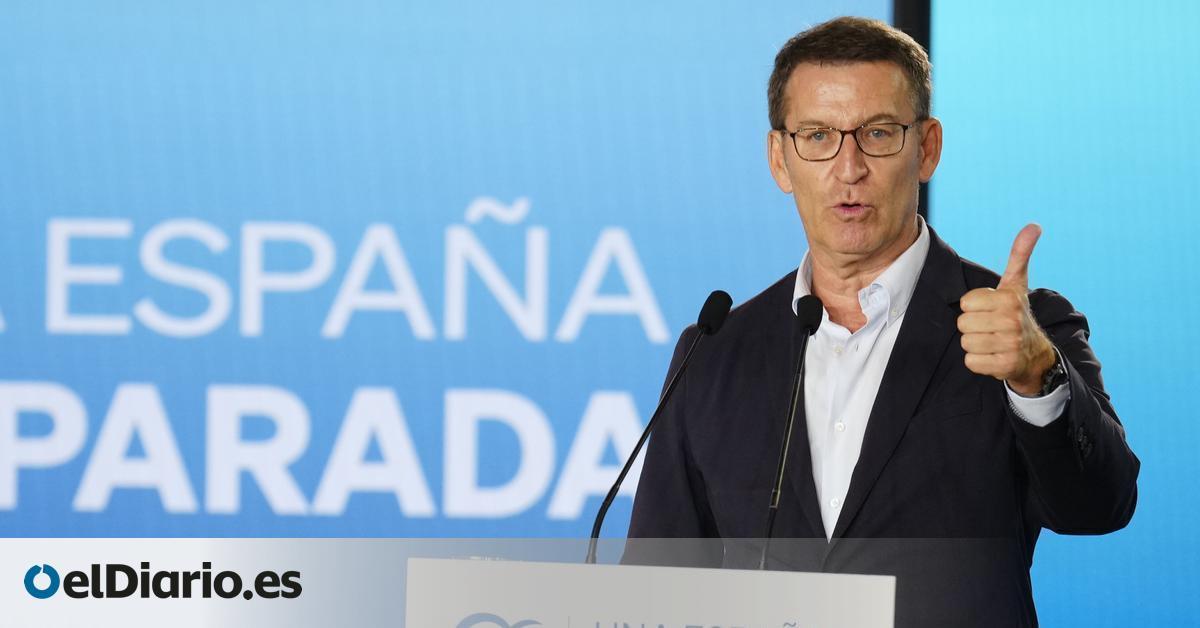
In the previous electoral chapter, on the night of May 28, the PP celebrated its victory in the municipal and regional elections with great revelry. Alberto Núñez Feijóo saw that several regional governments and important city councils could be snatched from the progressive bloc articulated by PSOE and United We Can. The path to Moncloa seemed clear. The ‘sanchismo’, sunk. The euphoria was such that the surprising electoral advance decreed the next day by Pedro Sánchez was received almost with joy, as a symptom of the decomposition of the Executive.
The agreements with Vox turn the PP into a “cage of shackles” in the face of Feijóo’s lack of leadership
Further
María Guardiola from Extremadura and the rest of the barons were received on the 30th at the national headquarters as heroes who returned from a triumphant campaign and paid tribute to the emperor for their conquests. The difference with the PSOE in the municipal elections was three points, but the institutional power achieved by the popular (thanks to the sum with Vox) served on a platter the story that the road to La Moncloa was guaranteed in the absence of a last stage of procedure: 23J.
A month later, that euphoria has softened at number 13 Calle de Génova in Madrid. The optimism continues and the latest surveys have contributed to this – from the one by GAD3 for ABC and the CIS, which places it ahead of the PSOE for the first time, although far from the absolute majority, to the Catalan CEO, which places it fighting for the second position to Junts and Esquerra–, but there is the unknown of how the pacts with Vox can influence the Valencian Community, Extremadura and the Balearic Islands.
Whatever the final result, the framework of the campaign is different from that of 28M: EH Bildu no longer dominates the headlines, the socialist barons heal their wounds. The always critical ex-leaders (except for Alfonso Guerra or some who implore a position in a hypothetical Feijóo government) have opted for silence and in their place others have gone on the offensive, as is the case of José Luis Rodríguez Zapatero and even some ex-felipistas . With no time to react between the 28M debacle and a new campaign, the PSOE traces its own pessimism.
In private, the leaders of the PP make cheers that place them above 150 seats. Feijóo behaves as if instead of the candidate, he had victory in hand and seeks a conservative strategy that involves not making mistakes. An example is the decision not to go to the electoral debates and reduce his presence to a face-to-face with Sánchez on the Atresmedia set.
The popular ones try to bury the controversies that persecute their leader, such as hiding the bonus that the party leaders receive, including the president, although the laws force them to be transparent with the money received by public officials. But above all they try to minimize the scope of their pacts with Vox, the elephant in the room, the most uncomfortable issue that even the media right, with the centenary ABC at the helm, has reproached him for.
And they try to downplay the episodes of censorship that are beginning to surface in some of their institutions regarding plays and even animated films, which have led to manifestos against them signed by personalities from the world of culture.
The PP tries to turn the page on the heavy digestion of these agreements -more than 100 in different municipalities- and the absurdity of Extremadura that led the leadership of the PP to rectify María Guardiola so that she would accommodate the extreme right of Vox, which he had been abjuring for months, to the point of threatening to resign rather than give them any advice.
Now they are trying to avoid another pact in Murcia, whose investiture session begins this Thursday and coincides with the hanging of posters. A secondary matter, in any case, after Feijóo has admitted that if they do not give him the numbers there will be Vox ministers in his government, who knows if even vice president.
Not only have the PP and Vox pacts changed the framework of the campaign, the response that Pedro Sánchez has chosen to confront the attacks from the right is also different. The president has gone on the offensive and in just ten days he has gone through the microphones of radio stations and television stations that are hostile to him and to which he had refused to go for the last four years: from Onda Cero to ‘El Hormiguero’, through the program by Ana Rosa Quintana.
The first sign of the PSOE’s change in strategy was the proposal to hold a weekly televised debate with Feijóo. An exotic idea that was received with indifference by the PP, but that tries to portray an elusive candidate in the PP.
Feijóo has only accepted a ‘face to face’ with Sánchez, at Atresmedia. Along the way, he has rejected two separate ‘four’ debates (with Sumar and Vox) on RTVE and Grupo Prisa. The first will be held and, except for last-minute changes, with the lectern of the PP candidate empty. The second has been called off after Vox’s refusal to attend “due to scheduling problems.”
In the PP they try to avoid the image of “blocks” that their leader has tried to break since his arrival in Madrid, in April 2022. But the pacts with Vox to wrest maximum territorial power from the other block have partially distorted the strategy. The transfers in Barcelona (to the PSC), in Vitoria (to the PSOE) or in Gipuzkoa (to the PNV) have been covered up by the agreements with the ultra-right to gain important town halls where the PSOE had won the elections. In total there are more than 130 municipalities where the popular govern together with the extreme right.
The map of municipal power in large Spanish cities
Find your municipality to find out who will be your mayor for the next four years in cities with more than 40,000 inhabitants
PP
PSOE
EAJ-PNV
ERC
together
CCa
BNG
commitment
In common
Feijóo, who came to the presidency of the PP convinced of himself and urging Sánchez to debate him in the Senate, refuses to confront the candidate for re-election and the representatives of the main parties during the campaign.
The epistolary attempts of the PP leadership to turn their ‘no’ into a refusal by Sánchez to share the set with EH Bildu and ERC have failed, proof that Feijóo’s attempt to insist on what worked in May does not guarantee victory now. The latest turn of the Galician leader on Yolanda Díaz’s labor reform and the commitment made before Brussels not to touch it show that the “repeal of sanchismo” is little more than a slogan, but that the popular ones are going to continue exploiting, confident that The desire to evict the president weighs more than the rejection of his pacts with the extreme right. Despite the fact that these agreements stained the map of autonomies and city councils blue, the distance in the municipalities was three points over the PSOE.
—————–
we need you more than ever
The electoral result of the municipal and regional elections leaves no room for doubt. A reactionary wave is coming and most of the media are swimming in the same direction. elDiario.es has become one of the few leading newspapers, with the ability to set the agenda and uncover exclusive investigations, which remains independent and is not captured by the right.
If you believe that journalism matters and affects our lives, please support us. Today we need you more than ever. Become a member, become a member, of elDiario.es
Source: www.eldiario.es


